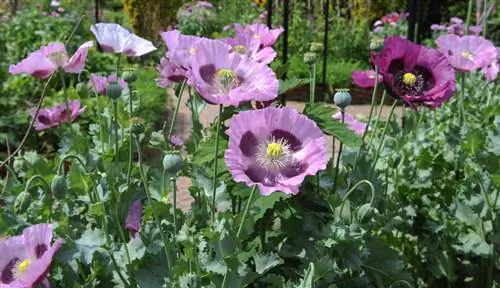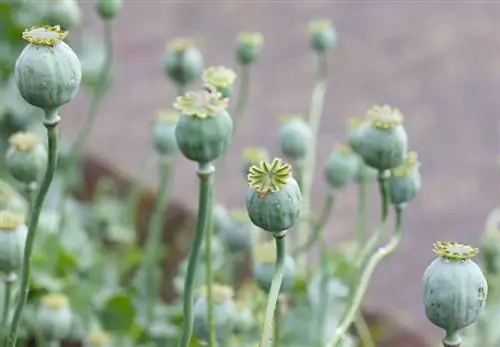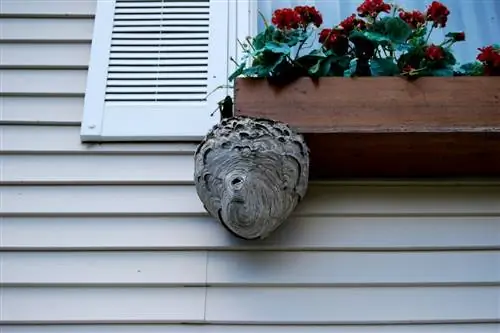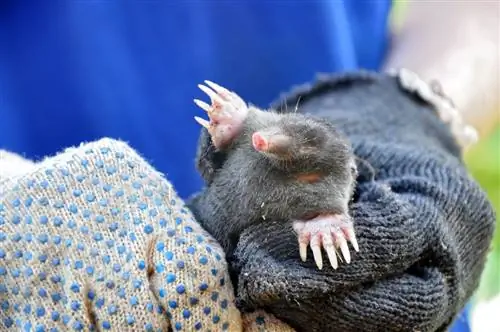- Author admin leonars@hobbygardeners.com.
- Public 2023-12-16 16:46.
- Last modified 2025-01-23 11:20.
Poppy seed rolls and bread, poppy seed cakes, yeast dumplings and numerous other delicacies: The black, white or blue seeds of the opium poppy (Papaver somniferum) are often used for sweet baked goods in this country. However, since the plants also contain large amounts of opiates - after all, opium and heroin are produced from opium poppies - their cultivation falls under the Narcotics Act and is only permitted in exceptional cases and to a small extent. Since growing opium poppies is illegal in Germany, there are no instructions here.
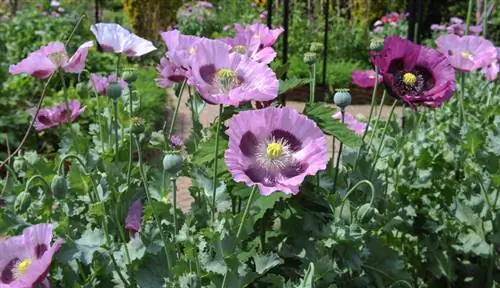
Is growing opium poppies allowed in Germany?
The cultivation of opium poppies (Papaver somniferum) in Germany is illegal because these plants fall under the Narcotics Act. Alternatively, permitted poppy varieties such as golden poppy, Turkish poppy, Alpine poppy or Icelandic poppy can be planted, which contain no or only small amounts of opiates.
Opium poppy falls under the Narcotics Act
Opium poppy is sometimes found growing wild or as an ornamental plant in gardens, although its cultivation is illegal and punishable by prison sentences of up to five years. The reason for this is the high content of opiates, which are mostly obtained from the milky sap of plants. Opium is basically nothing more than the dried latex of the opium poppy; heroin is also made from the plant. Both drugs fall under the Narcotics Act - and so does the opium poppy.
Numerous poppy varieties without opiates
If you only want to cultivate poppies as an ornamental plant in the garden, we recommend growing other, permitted poppy varieties instead of the forbidden opium poppy, such as the golden poppy, which blooms in pretty orange tones, the often deep red Turkish poppy, the white alpine poppy or the colorful poppy Iceland poppy. These species and their varieties contain either no or only insignificant amounts of opiates, which is why their cultivation is harmless and therefore permitted.
Planting opium poppies is forbidden in Germany
The cultivation of opium poppies - even if it is just a single plant - is strictly forbidden in Germany. This applies not only to commercial cultivation, but also to cultivation on small areas in private gardens. In exceptional cases, however, a permit can be granted upon request, although this is usually only granted to companies or (scientific) institutions and is also subject to a fee. The application can be submitted to the Federal Opium Office, which is subordinate to the Federal Institute for Drugs and Medical Devices.
Don't dare to experiment
However, the ban is not punished particularly severely, after all the plant also grows wild in this country. Even individual copies usually have no consequences. So if you happen to find opium poppies or they grow sporadically in your garden, you don't have to panic straight away - but you shouldn't dare to experiment with home-made opium. Since the opium content varies greatly depending on the location and weather conditions and therefore precise statements cannot be made, but even small amounts of opiates can be fatal, it is better not to try them.
Tip
Opium poppy can still often be found in East German allotment gardens today, as cultivation was permitted in the former GDR until reunification. The fact that planting is now strictly prohibited and can be punished with sometimes drastic prison sentences and fines has not yet spread to all allotment gardeners.

